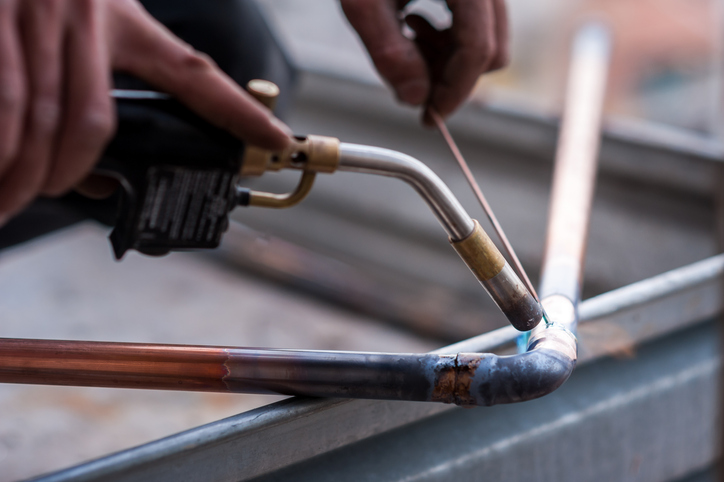Contact Us Today
For your CNC Turning and Milling Services!
Contact Us
Precision soldering services are used to join two or more pieces of metal together in various standard and complex applications. The most common ways to join metals include welding, soldering, and brazing. Soldering and brazing are similar processes and, unlike welding, do not melt the base metal. Soldering and brazing might be used over welding when:
Though they are similar, soldering and brazing do have unique differences. Read more about soldering and brazing here.
During the soldering process, the operator places a separate alloy (known as a solder) between two metals. The operator then melts the solder with a soldering iron, gun, or torch. As it cools, the solder hardens and creates a bond between the metal pieces. Typically, the operator will also use a flux during the soldering process.
Fluxes aid the soldering process by removing surface oxides that form on the metals. They also increase the wetting ability of the solder, which allows it to flow more uniformly over surfaces without balling up. Lastly, they are integral to aiding capillary action, which draws the solder into the gap between the two metals. Fluxes come in many forms including solids, powders, pastes, and liquids.
Soldering is especially attractive as it can be undone in a process called “desoldering.” There are various desoldering techniques, and most involve heating the solder and removing it with another tool, like a solder sucker or tweezers, for example.
There are two different types of soldering: hard soldering and soft soldering. Soft soldering is typically performed at a lower heat than hard soldering and requires an electric or gas-powered soldering iron. Manufacturers largely used a lead and tin solder for soft soldering until 2006, when the European Union banned the use of lead solders. Lead-free solder material then started taking off, with U.S. manufacturers eligible for tax benefits for using lead-free material. These non-lead solders typically have a higher melting point than the lead-tin mixture.
Hard soldering — often called silver soldering if a silver alloy is used — creates a stronger bond than soft soldering and is performed at higher temperatures than soft soldering. Unlike soft soldering, hard soldering uses a torch fueled by gas and oxygen. Solders used in the hard soldering process are usually made of a copper-zinc alloy, with a certain proportion of silver, cadmium, nickel, or phosphorus.
There are numerous advantages to soldering, making it a staple in a wide array of industries, especially the electronics sector. Soldering requires a low amount of power and doesn’t have risk for thermal distortions and residual stresses on joint parts. Soldering can join a wide variety of dissimilar materials and it reduces the need for extensive wiring in small parts.
Soldering services are used in various industries, including the electronics, aerospace, automotive, medical, and jewelry sectors, to name a few.
Soldering is used in the electronics industry to complete electrical connections, like joining copper to printed circuit boards. Soldering offers a stable connection in small, tight spaces where wires cannot fit.
Silver soldering is typically used in aerospace applications to produce high-pressure oxygen lines and other parts that must endure vibration and high temperatures. It may also be used in aircraft electronic controls, spacecraft plumbing, or other applications.
As the automotive industry continues to innovate, electrical components are becoming more and more popular. Most automotive electronics require soldering to endure temperature variations, mechanical shock, vibration, high-power voltage, humidity, and other extreme environmental conditions.
Medical devices require precision soldering that meet tight tolerances and high quality standards. MRI and CT electronics, endoscopes, diagnostic equipment, imaging equipment for handheld monitoring devices, and sensors for temperature-sensitive devices are typically made using soldering techniques.
Soft soldering is used to create custom base-metal jewelry, fuse base-metal components, or make a repair. Brass, copper, or bronze components might also be fused using hard solders.
At China Prototype Machining, we specialize in joining brass to brass, brass to stainless steel, and stainless steel to stainless steel for various industries. We are able to accurately assemble CNC machined parts to complete the exact product you need. Our ultrasonic cleaning service allows for us to clean any breathing circuits and other components to restore them back to their original form. View some of our soldering samples here.
We have a talented staff of experienced engineers, CNC machinists, and assemblers to help with your unique project. Our employees share a passion for providing the best possible product to each of our customers. In fact, the State of Wisconsin recognized our commitment to quality by naming us a Certified Precision Machine Shop. Additionally, with our ISO 13485 and ISO 9001:2015 certifications, you can be sure your project is in good hands.
Reach out to one of our experts today to learn more about our capabilities and discuss how our precision soldering services can fulfill your metal needs.